Sandy Jones, 1938-2023
![Sandy Jones with his Balvenie Medal at the 2017 Glenfiddich Solo Piping Championships. [Photo Derek Maxwell]](https://www.pipesdrums.com/storage/2023/03/Jones_Sandy_BalvenieMedal2017_02.jpg)
Born in Idaho in 1938 to parents with Scottish heritage, Jones started piping in 1946 with George Mars of Victoria, British Columbia, and would join the United States Air Force, becoming pipe-major of the USAF Pipe Band for eight years. The band became one of the first excellent American pipe bands and gained international fame Jones led the group at the cortege for the funeral of President John. F. Kennedy in November 1963.
The USAF Pipe Band under Jones would boast many American piping and drumming luminaries, including Donald Lindsay, Gerry Quigg, John Bosworth, Jim Neary, and Ernie Rookard.
While with the USAF he studied piping with Jack Chisolm of Inverness, Scotland, and, latterly, with the great John MacFadyen of Glasgow, who helped shape his piobaireachd knowledge.
Jones and MacFadyen would start the North American Academy of Piping in Valle Crucis, North Carolina, where, for five weeks every summer beginning in the 1970s and continuing today, thousands of pupils have collectively received instruction in piping and drumming over the years.
After retiring from the United States Air Force, Sandy Jones became piping director at The Citadel, the Military College of South Carolina, and from 1978 to 2003, he taught hundreds of cadet soldiers, many of whom went on the excellent success in solo competition and competitive piping bands.
He also was pipe-major of the Washington, DC-based Grade 2 Denny & Dunipace, a band that for many years was the best in the United States, featuring the likes of Charlie and Paula Glendinning and Jon Quigg in its ranks.
A sought-after teacher and long-time judge and leader with the Eastern United States Pipe Band Association, Sandy Jones was a beloved figure in North American and, indeed, world piping.
Our sympathies go to Sandy Jones’s family and friends at this sad time.
Here is the full text of Colin MacLellan’s speech at the 2017 Glenfiddich Championships for Sandy Jones as he was presented the Balvenie Medal.
If one looks at the now lengthy list of Balvenie Medal winners since 1974, we see some of the very important contributors to the art of piping in recent times. These names include those who have made their mark as players, teachers, composers, and educators. The name which is about to be added tonight stands tall amongst all of these great names.
Part of the drama as it were in making the annual award is of course to try to keep both the recipient and you, the audience in suspense until the very last moment as to the identity of the person who is given the award; but as soon as I start to tell you about the gentleman in question (well, there you go, I have immediately ruled out around fifty percent of potential candidates by saying “gentleman”, sorry ladies!) he will himself know; and so it is you, the audience, who surely will not be long in guessing who we are talking about. Mind you, he is not from the UK, nor in fact has much of his work ever been done outside his native United States, so you might find it more difficult than you think!
The person whom we are talking about was born in 1938 in Wallace, Idaho. His great grandfather, John Cameron, emigrated from Scotland, following the steps of many countrymen, to Canada, and then to Idaho. A piper since the age of eight, he began learning from George Mars of Victoria, British Columbia, eventually serving with the United States Air Force Pipe Band becoming Pipe-Major of this organization for eight years. During his tenure in the Air Force he continued his studies of the bagpipe with Jack Chisolm of Inverness, Scotland, and the late great John MacFadyen of Glasgow, Scotland.
The United States Air Force Pipe Band was one of the first modern outfits which gained pipe band celebrity, based centrally near Washington, DC, performing at high profile events for Presidents, Heads of State and dignitaries of foreign nations, often at the White House, with the Band being a particular favourite of President John F. Kennedy. To mark one of these state occasions, our recipient was asked to create an original composition for a state dinner for the Prime Minister of Ireland in October 1963. He wrote “President Kennedy’s Welcome to Sean Lemass,” which was played at the Dinner, with the original score signed by both Kennedy and the Irish President.
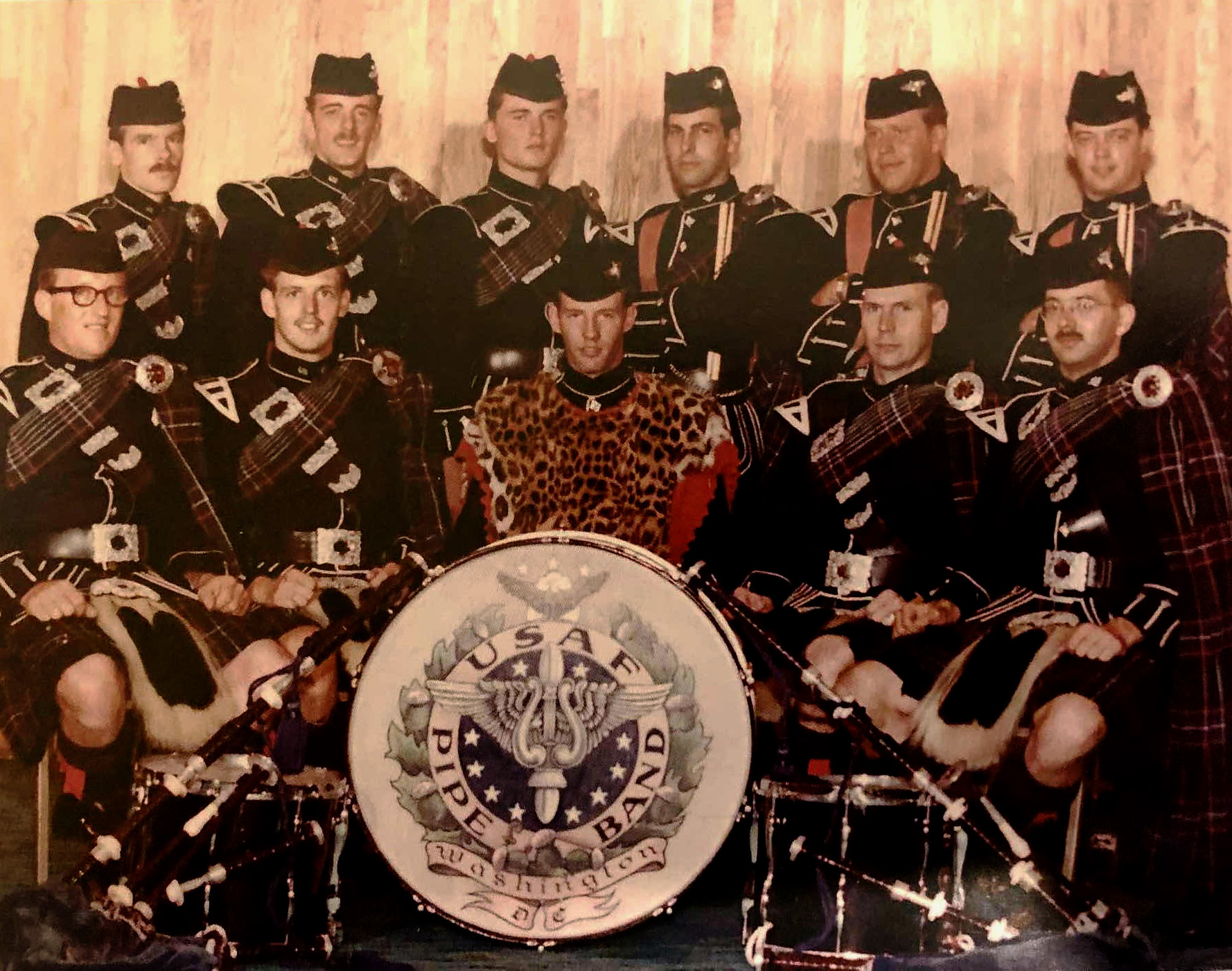
Sadly of course, only a matter of days later, President Kennedy was assassinated in Dallas, and Mrs. Kennedy specifically requested the United States Air Force Pipe Band to perform the last tribute at the graveside in Arlington cemetery, the tune being one of the Kennedy’s favourites, “The Mist Covered Mountains”. This tune became the title track of an album produced by the Band during this period, in fact it is where I myself can trace the roots of my great friendship with tonight’s recipient of the Balvenie Medal; he had visited and had given my father a copy of this album, which was full of innovative new music; stuff like “The Boys from Blue Hill,” “The Blackberry Bush,” arrangements of medleys which were ground breaking stuff at the time. As a child just beginning the pipes I literally, as they say, wore the grooves out of that album and it was instrumental in the formation of my own love of our beloved instrument.
In 1965, our man, while still in the USAF Pipe Band, held talks and discussions with the St. Andrews Societies and Caledonian clubs of the Couer D’Alene, Idaho, area. This was an event which became the impetus for creating the Couer D’Alene piping school founded by Col. John MacEwing.
This school was attended by John MacLellan, followed by Bob Hardie and then Andrew Wright, and was possibly the first of the grand summer school productions which lay the groundwork of the success we continually see from pipers overseas.
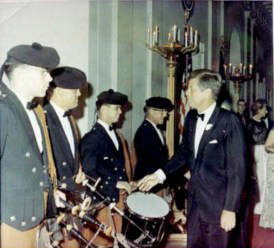
Staying in the DC area, he founded the Annapolis, Maryland band which became eventually the City of Washington Pipe Band which featured many pupils of his, and he was deeply involved in the very successful teaching programme of Peary High School. In 1970, he and John MacFadyen with whom he had formed a life-long bond founded the North American Academy of Piping, located in the Appalachian Mountains in Valle Crucis, North Carolina. For five weeks each June and July, at least 250 attend the academy. This year will be the School’s 48th consecutive year, I believe making it the longest running in the world, and a quick reckoning will indicate that some 10,000 students so far have benefited from tuition at the School. The philosophy here has always been of teaching and education; the people hired to deliver the programmes at the school invariably are highly qualified in the field of academics and education.
Following his stint in the Air Force, became piping director at The Military College of South Carolina, The Citadel, in 1978. During his 25-year stint, he taught hundreds of cadets, as well as training then most successful to become Pipe-Majors. His impact there was huge, and his position there also involved becoming the discipline officer in the Commandant’s office; at one of the United States’ most strictly run Military College’s this was a position of great responsibility and he became known as someone to be respected for his own bearing and fairness. In fact, I believe the very first digitised set of Piobaireachd Books were produced at the Citadel when a rather hapless cadet was given the rather easy choice of either spending considerable hours copying every page of the books and compiling them digitally, or taking his medicine in the more traditional way of running around a parade square heavily weighted by military equipment. He was promoted from Captain to Major when he took the Citadel Pipe Band to perform at the Edinburgh Tattoo in 1991, which was the first time a military college band had been chosen to do so. During this time authored the best – selling tutor book, Beginning the Bagpipe.
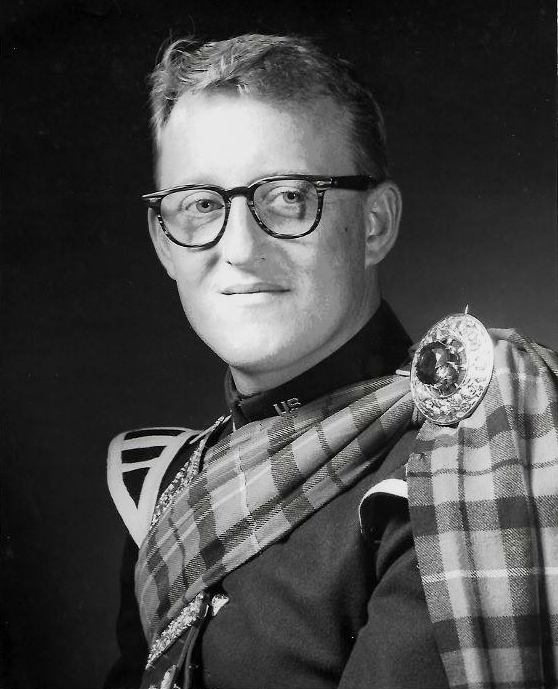
In Charleston he founded yet another band called the Charleston Pipes & Drums, which was made up of young people from the area whom he had taught under the umbrella of the City of Charleston Police Department in the late 1980’s which continues to this day with many of the players in it being former students of his. For his years of service to the school and to his art, as well as a way to honour him, his Charleston colleagues instituted an invitational event in his name which invites the top Amateur Grade I bagpipe players from the East Coast of America to perform.
As if all this was not enough, he was one of the founding members of The Eastern United States Pipe Band Association, and has served in the past for many years as President. He has been one of the senior piping and pipe band judges of that Association for over 50 years. He has served on the founding committee of the world-famous Grandfather Mountain Highland Games, and worked closely with Agnes MacRae Morton, in instituting the Piping and Pipe Bands programmes at the Gathering. After decades of service, he was appointed President of Grandfather Mountain Highland Games in 2014, which may quite legitimately lay claim to now being the largest Highland Gathering in the world.
After retiring from The Citadel in 2003, he moved with his wife (who like all piping wives, has been unstinting in her support and work involved in all of his achievements and activities) from Charleston, South Carolina, to Brevard, North Carolina, and now to the somewhat aptly named Jonesville, Tennessee. They have three daughters one of whom is a piper and a fiddler, and grandchildren who also excel in piping and music. He continues to visit all over North America as a piping adjudicator, teacher, and continues to run the Summer School annually. He will give a talk at the National Piping Centre this coming Wednesday at noon about his life’s experience and philosophy in teaching, so please think about attending that and learning more of this great man’s life.
Ladies and gentlemen, if you have not guessed who we are talking about by now, I will leave you in suspense no longer. He’s sitting modestly over there, a man who above all in the last half century has done an immense service for the advancement of piping in America and who has helped and taught thousands of pipers. He has deservedly become the grandfather of American piping. His name is Major Sandy Jones, and he is the 2017 recipient of the Balvenie Medal.


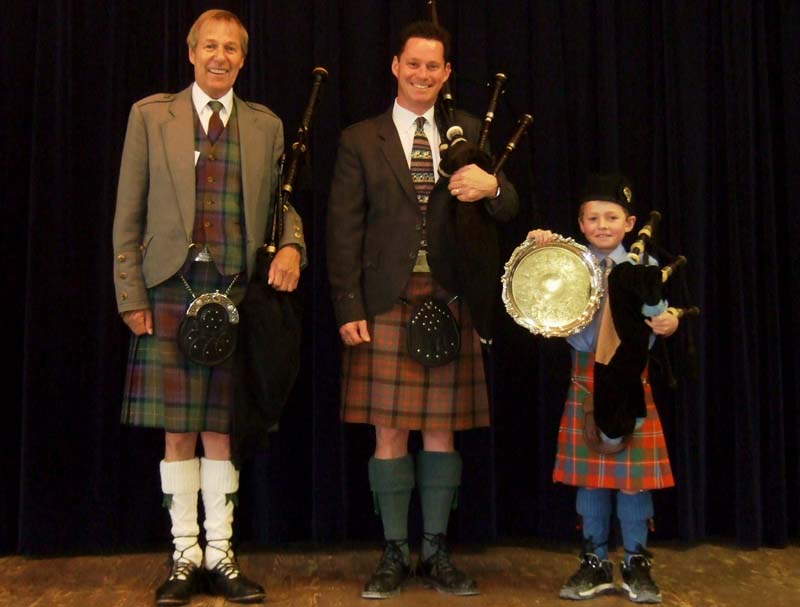

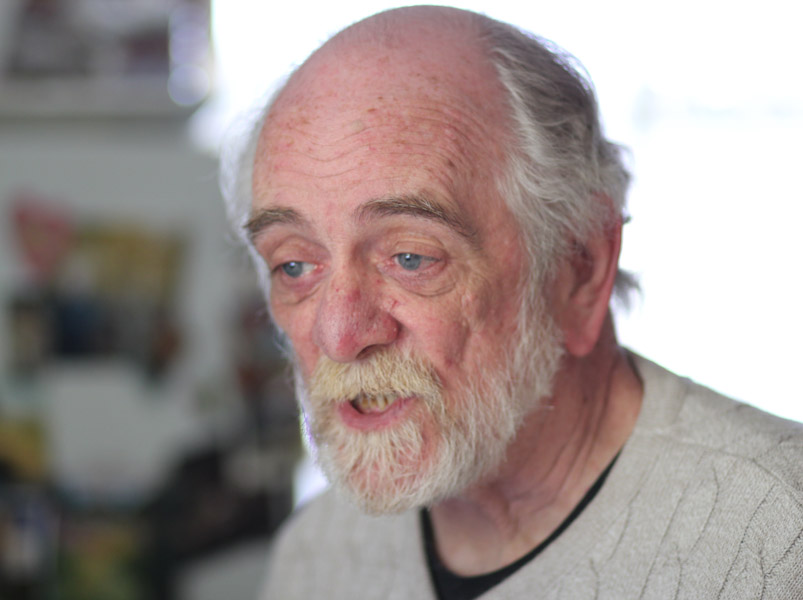
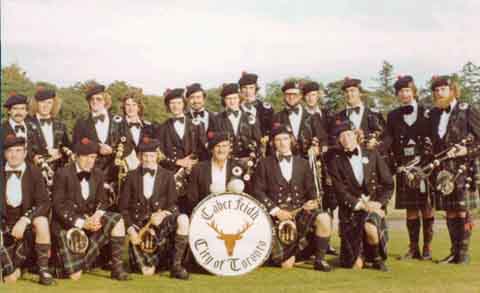
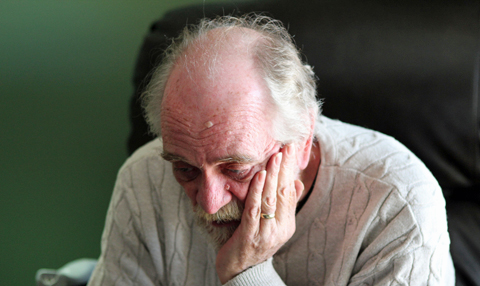
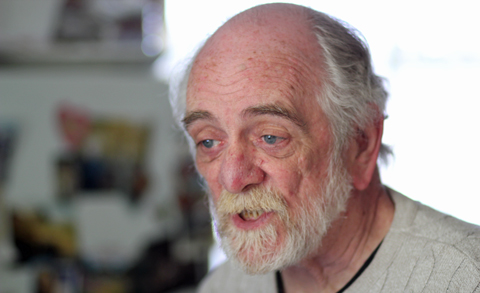
Sandy possessed the sharpest wit in any room, matched only by his encouraging personality. He radiated warmth and charisma, earning the respect of people of all ages and backgrounds. I am immensely grateful for the time I spent with him.
It’s hard to believe that Sandy is gone because he never seemed to slow down. He was still judging, running a five-week summer school, serving on the music board for the pipe band association, and volunteering with the Grandfather Mountain Highland Games, all while keeping close with family and friends.
Sandy was a natural storyteller, and his stories seemed to get better with each retelling. I look forward to hearing his stories and memories recounted by others in the coming months. His departure leaves a void, but as he would say every morning at his summer school, “let’s get cracking” and continue his legacy.
My heartfelt condolences go out to his family, especially Dorcas, Cathi, Amelia, and Cam.
Farewell, Sandy, or as you would say in your folksy and unpretentious manner, “Toodles.” You will be deeply missed.
Mr Jones was a formidable bagpiper alongside William (Bill) Thomas and George Mars with the founding of the Angus Scott Pipes and Drums located in Spokane, WA in the late 50’s and mid 60’s. He will be dearly missed from those pipers in our band who still remember him and those who still went out to the Grandfather Mountain Games.
Our deepest sympathies to his wife Dorca and the family,
The Angus Scott Pipe Band
http://www.ASPBand.com
My very first bagpipe band cassette tape was Denny and Dunipace I bought in 1988. I got so much inspiration from that recording, even as I didn’t have a clue as to who was who in the piping world back then.
RIP Sandy and condolences to his family.